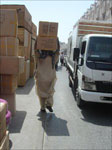 Reuters: Iran said it would seek to cut imports of non-essential goods and urged its citizens to reduce their use of foreign-made mobile telephones and cars, as the country struggles to cope with Western economic sanctions. By Yeganeh Torbati
Reuters: Iran said it would seek to cut imports of non-essential goods and urged its citizens to reduce their use of foreign-made mobile telephones and cars, as the country struggles to cope with Western economic sanctions. By Yeganeh Torbati
DUBAI
 (Reuters) – Iran said it would seek to cut imports of non-essential goods and urged its citizens to reduce their use of foreign-made mobile telephones and cars, as the country struggles to cope with Western economic sanctions.
(Reuters) – Iran said it would seek to cut imports of non-essential goods and urged its citizens to reduce their use of foreign-made mobile telephones and cars, as the country struggles to cope with Western economic sanctions.
The policies suggest the government is moving the economy onto an austerity footing to resist the sanctions, which have been imposed over Iran’s controversial nuclear programme and have slashed its income from oil exports this year.
Authorities have divided imports into 10 categories based on how essential they are, and will provide importers with dollars at a subsidised rate to buy basic goods, Deputy Industry Minister Hamid Safdel was quoted as saying on Sunday.
Meanwhile, importers of goods in two non-essential categories will have to obtain dollars at much more expensive rates on the open market, the Iranian Students’ News Agency (ISNA) quoted him as saying.
Goods in these two categories include cigarette papers, wallpaper, mobile phones, luggage, clothing and cars, ISNA reported. It said about $10 to $12 billion (6.2 to 7.5 billion pounds) was spent annually on importing luxury and non-essential goods into Iran.
Industry Minister Mehdi Ghazanfari urged Iranians on Saturday to limit their use of such goods and turn to domestic manufacturers to help the government cope with sanctions.
“If we move towards reducing the import of goods in these categories, which are not so necessary, we can save foreign exchange,” Ghazanfari said, according to the Mehr news agency. “If people do not use these goods, the need for currency for them would drop to zero.”
RATES
As the value of its rial currency has plunged in the face of the sanctions this year, Iran has moved gradually to favour essential imports while discouraging luxuries. The latest announcements showed it was stepping up this approach.
A new foreign exchange centre established last month supplies petrodollars to designated importers at cheap rates of roughly 25,000 rials per dollar.
At the same time, the rial was trading in the open market at around 34,000 on Sunday, Tehran money changers said – less than half its value a year ago, and down about a quarter since late last month.
Currency trading volumes in the open market are very low, since the central bank cut back its supplies of dollars to the market. The arrest of traders on charges of manipulating the rial in recent weeks has also made money changers cautious.
With a gross domestic product of about $6,400 per person, according to the International Monetary Fund, Iran is not a wealthy country overall.
But its population of about 75 million includes a sizeable urban middle class who have been avid consumers of foreign-made goods, including Samsung and Sony electronics and Peugeot cars.
Safdel said on Sunday there were no plans to raise import tariffs on luxury items; authorities apparently think the rial’s weakness will be enough to slash purchases of those goods.
Iran’s merchandise imports are running at slightly over $50 billion a year, according to the government, so if it succeeds in slashing them by an amount close to $10-12 billion, that could reduce pressure to run down its foreign exchange reserves.
The reserves stood at $106 billion at the end of last year, according to the IMF, but some analysts estimate they may have dropped by several tens of billions of dollars as the sanctions cut oil income. The government keeps their level secret.
Tehran’s effort to use the exchange rate to reduce luxury imports risks a surge in corruption and black market dealing. Traders now have the opportunity to make huge profits if they can illegally obtain dollars at subsidised rates and use them to import luxuries.
Mohammad Bayatian, a member of parliament’s industry committee, said last week the committee would investigate claims that 750 luxury cars were imported illegally using cheap dollars purchased at a special government rate of 12,260 rials, parliamentary news agency Icana said. That rate is supposed to be used for the most vital goods such as food and medicine.
(Editing by Andrew Torchia and Rosalind Russell)


